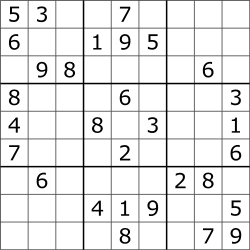5 ways sudoku boosts brain health

If you’re searching for ways to improve your mental health, playing puzzles like sudoku is a great start. Since our brain is at the center of all of our thoughts and decisions, keeping it active and healthy should be a priority.
Unlike some other parts of our body, the brain isn’t a muscle and can’t be improved through physical exercise. However, there are some mental exercises you can indulge in to improve your memory, help you to retain information better, and reduce your risk of cognitive disorders like dementia and Alzheimer’s.
According to a recent article in the International Journal of Geriatric Psychiatry, older adults who spend their time playing puzzles like sudoku showed improvement in their mental capacity and delayed symptoms of cognitive disorders for a period of ten years.
“Groups of people who have engaged in complex mentally stimulating activities such as crosswords and sudoku; learning a language; learning a new hobby, or even learning how to use new technology have a lower risk of dementia,” said Dr. Nicole Kochan, a clinical neuropsychologist at UNSW Medicine & Health.
Sudoku is a very straightforward and easy-to-learn puzzle that is often found in newspapers or magazines. The objective of the game is to use logical deductions to figure out how to place the correct numbers in cells within boxes within a grid of usually 9×9 cells. You win a game of sudoku if you can accomplish this by putting 1 of each of the numbers 1-9 within a cell in each of the 9 boxes and without repeating the same number on a line or within a box.
There are many variants of sudoku. For example, Wordoku has the same rules, but instead of numbers, you play using letters. Recently, puzzle creators have developed extremely difficult versions of sudoku using a wide variety of rules that add logical complexity. In fact, a popular YouTube channel called Cracking the Cryptic is a great entry point into these variants for anyone looking for a serious challenge or who just wants to watch how some of the world’s best puzzle solvers work.
However you enjoy your Sudoku, the mental health benefits of playing this puzzle game are vast, and here are some of them.
1. Sudoku improves your concentration
During gameplay, sudoku engages your brain and makes you think critically about which number to play across each grid. Doing this improves your concentration level as you simultaneously analyse different possible outcomes in your head.
The game of sudoku requires a lot of careful thought as you need to think about which numbers would fit the boxes without being duplicated across the grid. The more you play this game, the more you learn how to concentrate on building a winning strategy—and this can translate to real-life advantages as your brain becomes more trained to solving problems.
2. Sudoku improves your memory
Sudoku is a game that can do wonders for your brain’s memory and ability to retain information. This results from gameplay that involves working with a fixed set of numbers that are meant to be placed in certain places in a grid.
After learning how the rules work and where each number should be placed, it’s now left to you to remember what you need to do to win and replicate it in every game. Many online sudoku puzzles have a timer that helps to ensure your brain works optimally and processes information faster.
Once you know that you have limited time to complete a particular puzzle, your brain’s memory kicks in to help you to complete puzzles faster. The more you play, the easier it becomes for you to finish each puzzle.
3. Sudoku improves your learning capacity
Many online sudoku games are timed to encourage players to have a sense of urgency when solving the puzzle. As a result, the more you play, the more your speed will improve. Often, players are motivated by the challenge of beating the completion time of other players.
Since sudoku greatly improves the brain’s memory function, you should see some improvement over time. As you develop your skills, you’ll likely see your average completion times go down. More importantly, you’ll find yourself ready to tackle more and more difficult sudoku puzzles. Continuously exercising your brain with harder and harder puzzles can also improve your ability to process information as you go about your everyday life.
Retention is a huge part of learning and even more important when assimilating information quickly. The less time you need to review new information before your brain retains it, the better able you are to apply that information.
4. Sudoku encourages relaxation and reduces stress
Puzzle games like sudoku have a fun and relaxing effect on your mind. Even if you only spend 15 minutes solving a basic puzzle, the time spent on the sudoku is time not spent fixating on mundane or negative thoughts.
Taking short but necessary breaks like this while keeping your brain active—rather than shutting it down completely—can help you decongest, relax your mind, and reduce your stress.
5. Sudoku may reduce your risk of cognitive disorders
A game like sudoku, as well as other similar puzzles and mental exercises, can help delay symptoms of cognitive diseases such as Alzheimer’s and dementia, whether you’re young or old.
Regularly exercising your brain can protect it from decline. By trying new activities, especially ones that requires you to use different parts of your brain, you’re keeping your mind sharp, and this is a valuable step in reducing your risk of cognitive disorders.







